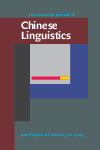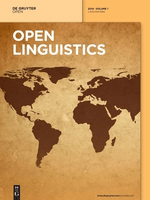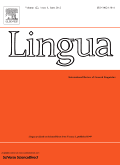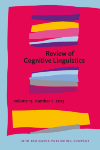
Cognitive Studies-Etudes Cognitives
Scope & Guideline
Unlocking the Complexity of Language and Thought
Introduction
Aims and Scopes
- Cognitive Linguistics:
Explores how language reflects and shapes cognitive processes, focusing on conceptualization, metaphor, and semantic networks. - Sociolinguistics:
Investigates language use within social contexts, including multilingualism, language attitudes, and the impact of sociopolitical factors on language practices. - Language Education and Acquisition:
Addresses challenges and methodologies in language teaching and learning, especially for bilingual and multilingual contexts. - Discourse Analysis:
Analyzes language in use across various domains, including media discourse, political language, and everyday communication. - Cultural Linguistics:
Examines how cultural factors influence language and cognition, particularly in bilingual and multicultural settings.
Trending and Emerging
- Bilingualism and Multilingualism:
There is a notable increase in studies focusing on bilingual and multilingual experiences, especially in the context of Ukrainian and Polish languages, reflecting current sociopolitical dynamics. - Language and Identity:
Research exploring the relationship between language use and identity formation, particularly in the context of conflict and migration, has gained prominence, highlighting the socio-cognitive dimensions of language. - Impact of War on Language Practices:
Emerging themes focus on how conflict, particularly the war in Ukraine, influences language attitudes, usage, and education, showcasing the intersection of sociolinguistics and cognitive studies. - Computational Linguistics and NLP:
An increase in studies utilizing computational methods for analyzing language data indicates a trend towards integrating technology with linguistic research, particularly in natural language processing. - Cognitive Discourse Analysis:
A rising interest in the cognitive aspects of discourse analysis demonstrates a blending of cognitive theories with practical discourse studies, particularly in political and media contexts.
Declining or Waning
- Historical Linguistics:
Themes related to historical language development and analysis have decreased, possibly due to a growing emphasis on contemporary sociolinguistic issues. - Language Policy and Planning:
Research on formal language policy has diminished, indicating a shift towards more immediate sociolinguistic phenomena rather than institutional frameworks. - Traditional Dialect Studies:
Studies focusing solely on regional dialects have become less frequent, suggesting a broader interest in sociolinguistic dynamics rather than isolated dialectal features. - Grammatical Theory:
Theoretical explorations of grammar as a standalone topic have seen reduced attention, as the journal increasingly prioritizes empirical and applied linguistic studies.
Similar Journals

International Journal of Chinese Linguistics
Pioneering Studies in Chinese LinguisticsInternational Journal of Chinese Linguistics is a distinguished publication that delves into various aspects of linguistic studies pertaining to the Chinese language. Published by John Benjamins Publishing Co, this journal stands out for its commitment to advancing the knowledge and understanding of Chinese linguistics within the global academic community. With an impact factor that places it in the Q2 quartile of linguistics and language, the journal is indexed in prominent databases, achieving ranks of #501 in Arts and Humanities and #580 in Social Sciences. These rankings reflect the journal's dedication to maintaining high scholarly standards and its relevance in both linguistic research and practical applications. While not categorized as Open Access, the journal provides necessary access through institutional subscriptions, thereby ensuring that valuable research reaches a broad audience. Covering a wide range of topics from syntax and phonetics to sociolinguistics and applied linguistics, the International Journal of Chinese Linguistics serves as an essential resource for researchers, professionals, and students seeking to deepen their understanding of the intricate relationship between language and culture in the Chinese context. With converging years from 2019 to 2024, it continues to evolve, reflecting ongoing developments in the field.

Open Linguistics
Connecting scholars and practitioners in linguistic exploration.Open Linguistics is a premier open access journal dedicated to advancing the field of linguistics, published by DE GRUYTER POLAND SP Z O O. Since its inception in 2014, the journal has consistently provided a platform for innovative research and critical discourse in various subfields of linguistics. With an impressive Q1 ranking in the linguistics category as of 2023, Open Linguistics is recognized for its significant contributions, ranking #223 out of 1088 in Arts and Humanities, as well as achieving a commendable #260 out of 1167 in Social Sciences. The journal's open access policy ensures that research is freely accessible to both scholars and practitioners, fostering a collaborative and inclusive academic community. With a focus on original research, reviews, and theoretical papers, Open Linguistics is positioned as an essential resource for researchers, educators, and students seeking to deepen their understanding of language and its diverse applications in society.

LINGUA
Connecting scholars through groundbreaking linguistic studies.LINGUA is a premier academic journal dedicated to the field of linguistics, published by ELSEVIER and based in the Netherlands. With an ISSN of 0024-3841 and an E-ISSN of 1872-6135, this esteemed journal has garnered a reputation for excellence, evidenced by its position in the top Q1 quartile in Linguistics and Language as of 2023. LINGUA serves as a vital platform for scholars, researchers, and students, showcasing innovative research and critical discussions across various linguistic subfields. The journal has demonstrated impressive Scopus rankings—151 out of 1088 for Language and Linguistics, and 176 out of 1167 in Social Sciences—placing it in the 86th and 84th percentiles, respectively. By providing a forum for the dissemination of advanced linguistic theories and their applications, LINGUA continues to significantly contribute to the academic community, making it an essential resource for anyone engaged in the study of language.

JOURNAL OF PSYCHOLINGUISTIC RESEARCH
Fostering Dialogue Between Linguistics and Cognitive ScienceJOURNAL OF PSYCHOLINGUISTIC RESEARCH is a premier scholarly publication dedicated to the interdisciplinary exploration of language and cognition. Established in 1971 and published by Springer/Plenum Publishers, this journal serves as a vital platform for researchers in Experimental and Cognitive Psychology, Linguistics, and related fields. With an impressive reputation reflected in its 2023 Category Quartiles—Q3 in Experimental and Cognitive Psychology, Q1 in Linguistics and Language, and Q2 in Psychology (miscellaneous)—the journal ranks prominently within the Scopus database, reaching the 88th percentile in Language and Linguistics. Researchers and professionals have the opportunity to disseminate their findings effectively, enriching contemporary understanding of psycholinguistic phenomena through rigorous peer-reviewed articles. Although currently not an open-access journal, it provides extensive access options that cater to a global audience, ensuring that the latest research is readily available to those dedicated to advancing this dynamic field. We invite scholars, practitioners, and students to engage with this essential resource for fresh insights and innovative research methodologies.

RUSSIAN LINGUISTICS
Illuminating the intersections of language and psychology.RUSSIAN LINGUISTICS is a peer-reviewed academic journal published by Springer, dedicated to advancing the understanding of the Russian language and its interplay with various linguistic frameworks. With a longstanding history that spans from its inception in 1974, the journal encompasses a broad range of topics within the fields of linguistics and language studies, offering valuable insights especially in *Developmental and Educational Psychology* and the intricacies of linguistics at large. Currently ranked in the Q2 quartile for Linguistics and Language, and holding substantial positions within Scopus rankings, RUSSIAN LINGUISTICS serves as an essential resource for researchers, educators, and students alike, fostering dialogue and collaboration within the international linguistic community. The journal notably provides critical access to research findings that enhance the comprehension of Russian linguistics' role in a global context, despite operating under a traditional access model. For those pursuing scholarly excellence, RUSSIAN LINGUISTICS remains a pivotal platform for disseminating innovative research and promoting the study of language.

SKASE Journal of Theoretical Linguistics
Illuminating the Evolving Landscapes of LanguageSKASE Journal of Theoretical Linguistics, published by the SLOVAK ASSOCIATION STUDY ENGLISH-SKASE, is a distinguished Open Access journal that expands the horizons of linguistic research and theoretical frameworks. With its ISSN N/A and E-ISSN 1336-782X, the journal has established itself as a pivotal resource for scholars in the field, achieving a commendable Q2 ranking in Linguistics and Language as of 2023. The journal, which has been in continuous publication since 2017, actively publishes innovative research studies, reviews, and theoretical discussions, easing access to groundbreaking work for academics and practitioners alike. Based in Slovakia, it connects a rich heritage of linguistic scholarship and is indexed in Scopus, ranking alongside its peers in both Arts and Humanities and Social Sciences categories. The SKASE Journal of Theoretical Linguistics is crucial for anyone interested in the evolving landscapes of linguistics, serving as an invaluable platform for disseminating knowledge and fostering collaboration amongst researchers worldwide.

Review of Cognitive Linguistics
Advancing Insights in Cognitive LinguisticsThe Review of Cognitive Linguistics, published by John Benjamins Publishing Co, is a premier academic journal dedicated to the exploration of cognitive approaches to linguistics. With an ISSN of 1877-9751 and E-ISSN 1877-976X, this journal provides a critical platform for researchers and professionals to disseminate their findings in the rapidly evolving fields of linguistics and language, alongside developmental and educational psychology. Hailing from the Netherlands, the journal boasts impressive standing within the academic community, as indicated by its 2023 Q1 ranking in Linguistics and Language and Q3 in Developmental and Educational Psychology. Additionally, its Scopus rankings reflect a strong position within the arts and humanities and social sciences categories. While currently operating under a traditional access model, this journal actively contributes to the overarching discourse within cognitive linguistics, and is a vital resource for those aiming to deepen their understanding of the intricate link between language and cognition. Researchers, educators, and students are encouraged to engage with the rich body of articles spanning its convergence years from 2010 to 2024, making it an essential read for those at the forefront of these interdisciplinary studies.

Functions of Language
Advancing Linguistic Insights for Practical ImpactFunctions of Language, published by John Benjamins Publishing Co, serves as a vital platform for scholars and practitioners in the fields of linguistics and language studies. With its ISSN 0929-998X and E-ISSN 1569-9765, this esteemed journal, based in the Netherlands, has solidified its reputation through a focused dedication to exploring the multifaceted roles that language plays across various contexts. Ranked in the top percentile of leading journals in Linguistics and Language (Q2 category, 2023) and holding impressive Scopus ranks within both the Arts and Humanities and Social Sciences sectors, the journal emphasizes research that interlinks theoretical insights with practical implications. Functions of Language aims to advance our understanding of linguistic structures and their applications, making it an essential resource for researchers, professionals, and students alike who are eager to contribute to the evolving discourse in language studies. With content converging from 1994 to 2024, the journal reflects ongoing scholarly engagement and innovation in the field.

CogniTextes
Connecting Disciplines, Enriching Minds.CogniTextes (ISSN: 1958-5322) is an esteemed open access journal published by the Association Française de Linguistique Cognitive, dedicated to the exploration of cognitive linguistics and its intersection with textual interpretation. Since its inception in 2007, CogniTextes has been a vital platform for disseminating cutting-edge research that delves into the cognitive processes underlying language use, enhancing our understanding of linguistics in a cognitive context. This journal not only fosters scholarly communication among researchers and professionals but also serves as a valuable resource for students keen on advancing their knowledge in cognitive linguistics. With its headquarters located at the University of Lille 3 in France, CogniTextes encourages contributions from a diverse spectrum of disciplines, thereby enriching the field of linguistics and cognitive studies. The journal's commitment to open access ensures that its findings are readily available to a global audience, thus facilitating knowledge sharing and academic discourse.

Language and Linguistics Compass
Charting New Territories in Language and LinguisticsLanguage and Linguistics Compass, published by Wiley, stands as a premier journal in the field of linguistics, showcasing innovative and interdisciplinary research. With its ISSN 1749-818X and E-ISSN matching, the journal has built a robust reputation, achieving an impressive Q1 ranking within the linguistics category for 2023, placing it in the top 4% of its field. Its Scopus rank of 48 out of 1167 highlights its influence and significance among linguistics journals, boasting a commendable 95th percentile. This journal serves as a vital resource for researchers, professionals, and students, offering a wide range of accessible articles that illuminate current trends and advances within the domain of language studies. Although it is not Open Access, the journal is committed to quality and diversity in its publications, ensuring scholarly articles from various sub-disciplines of linguistics are represented from 2008 through 2024. Located in the United Kingdom, Language and Linguistics Compass invites contributions from around the globe, reinforcing its status as a leading forum for linguistic discourse.